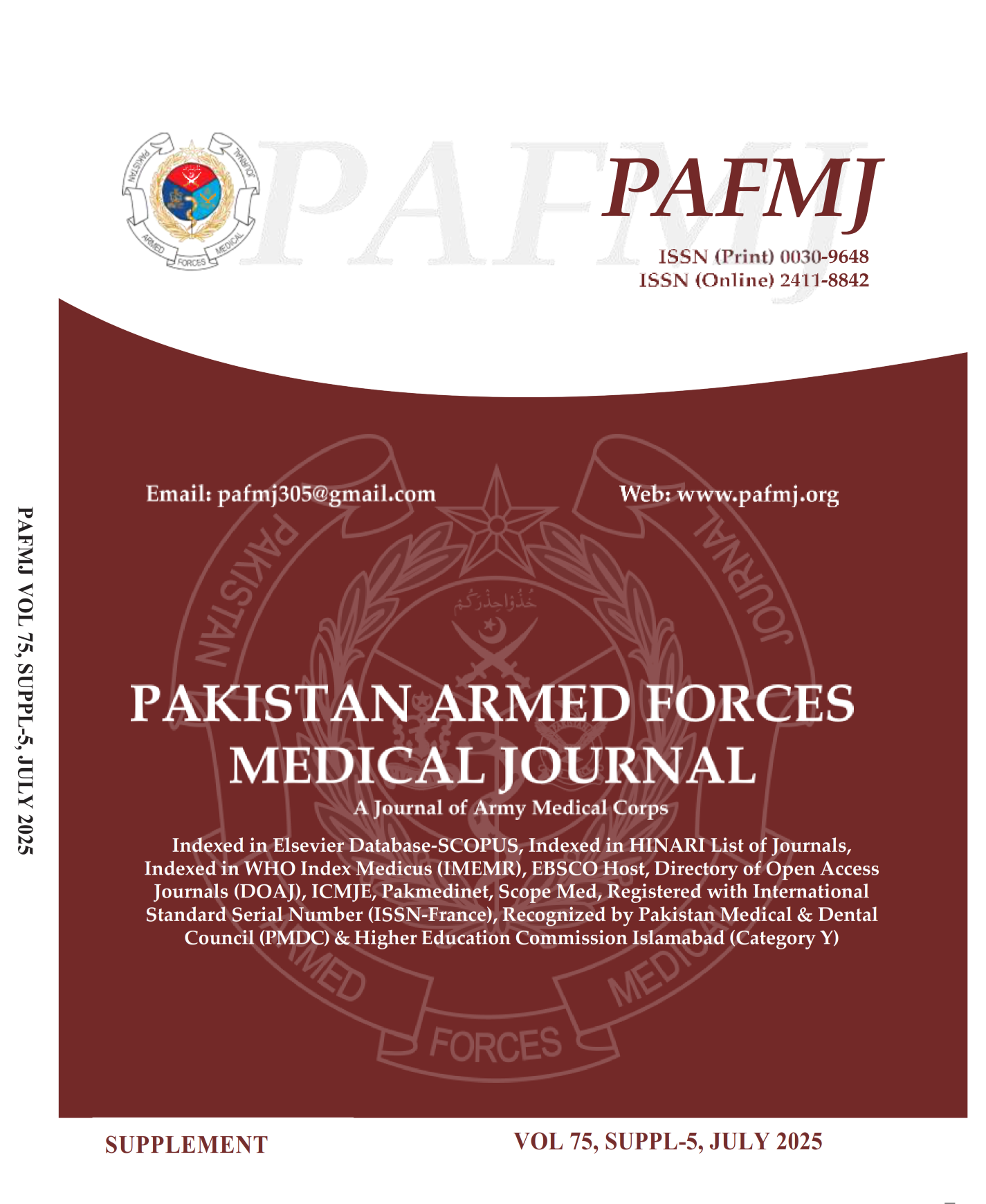Comparison of Outcome of Adipofascial Sural Flap Versus Sural Fasciocutaneous Flap for non-Weight Bearing Defects of Foot
DOI:
https://doi.org/10.51253/pafmj.v75iSUPPL-5.9433Keywords:
Adipofascial sural flap, Fasciocutaneous sural flap, Foot defects.Abstract
Objective: To study the outcomes of adipofascial sural flap versus sural fasciocutaneous flap for non-weight bearing defects of foot in terms of operative time and aesthetic outcome.
Study Design: Quasi-experimental study.
Place and Duration of Study: Department of Plastic Surgery, Combined Military Hospital, Rawalpindi, Pakistan Jun 2020 to 20 Jun 2022.
Methodology: A total of 88 patients diagnosed with lower limb skin defects requiring reconstruction were included in our study. Patients who had received previous surgery or were immunodeficient were excluded. All patients received a sural flap, patients in Group A received a fasciocutaneous flap while those in Group B received adipofascial flaps. Patients were assessed at three months for cosmetic outcomes via a 5-Point Likert scale, as well as for range of motion. Data was analyzed by SPSS 26.0.
Results: Adipofascial flaps have a better cosmetic outcome as compared to fasciocutaneous flaps at three months post-procedure, (p=0.046). Total recipient site complications were 5(11.4%) with fasciocutaneous flaps and 7(15.9%) with adipofascial flaps, (p=0.534). Donor site complications occurred in 5(11.4%) cases with fasciocutaneous flaps, while this number was 2(4.5%) with adipofascial flaps, (p=0.237).
Conclusion: The adipofascial flap has a better cosmetic outcome with a similar frequency of occurrence of complications when compared to fasciocutaneous flaps.
Downloads
References
1 Neumann MV, Strohm PC, Reising K, Zwingmann J, Hammer TO, Suedkamp NP et al. Complications after surgical management of distal lower leg fractures. Scand J Trauma Resusc Emerg Med 2016; 24(1): 146.
https://doi.org/10.1186/s13049-016-0333-1
2 Bekeny JC, Zolper EG, Steinberg JS, Attinger CE, Fan KL, Evans KK et al. Free tissue transfer for patients with chronic lower extremity wounds. Clin Plast Surg 2021; 48(2): 321-329.
https://doi.org/10.1016/j.cps.2021.01.004
3 Black CK, Kotha VS, Fan KL, Ragothaman K, Attinger CE, Evans KK et al. Pedicled and Free Tissue Transfers. Clin Podiatr Med Surg 2019; 36(3): 441-455.
https://doi.org/10.1016/j.cpm.2019.03.002
4 Donski PK, Fogdestam I. Distally based fasciocutaneous flap from the sural region. A preliminary report. Scand J Plast Reconstr Surg 1983; 17(3): 191-196.
https://doi.org/10.3109/02844318309013118
5 Hashmi DPM, Musaddiq A, Ali DM, Hashmi A, Zahid DM, Nawaz DZ et al. Long-Term Clinical and Functional Outcomes of Distally Based Sural Artery Flap: A Retrospective Case Series. JPRAS Open 2021; 30: 61-73.
https://doi.org/10.1016/j.jpra.2021.01.013
6 Bigcas JLM, Bond J. Osteocutaneous Radial Forearm Flap 2021 Dec 31. In: StatPearls [Internet]. Treasure Island (FL): StatPearls Publishing; 2022 Jan–.
7 Chiu YJ, Liao WC, Wang TH, Shih YC, Ma H, Lin CH, et al. A retrospective study: Multivariate logistic regression analysis of the outcomes after pressure sores reconstruction with fasciocutaneous, myocutaneous, and perforator flaps. J Plast Reconstr Aesthet Surg 2017; 70(8): 1038-1043.
https://doi.org/10.1016/j.bjps.2017.04.004
8 Xiao WA, Cao WL, Tian F, Tian LJ. Fasciocutaneous flap with perforating branches of peroneal artery repairing soft tissue loss in anterior and middle parts of children's feet: A STROBE-compliant article. Medicine (Baltimore) 2018; 97(31): e11351.
https://doi.org/10.1097/MD.0000000000011351
9 Reece EM, Bonelli MA, Livingston T, Mulligan PS, Rockwood J, Wilson JR, et al. Factors in Free Fasciocutaneous Flap Complications: A Logistic Regression Analysis. Plast Reconstr Surg 2015; 136(1): 54e-58e.
https://doi.org/10.1097/PRS.0000000000001377
10 Senyuva C, Yucel A, Fassio E, Cetinkale O, Goga D. Reverse first dorsal metatarsal artery adipofascial flap. Ann Plast Surg 1996; 36(2): 158-161.
https://doi.org/10.1097/00000637-199602000-00009
11 Schmidt K, Jakubietz M, Djalek S, Harenberg PS, Zeplin PH, Jakubietz R et al. The distally based adipofascial sural artery flap: faster, safer, and easier? A long-term comparison of the fasciocutaneous and adipofascial method in a multimorbid patient population. Plast Reconstr Surg 2012; 130(2): 360-368.
https://doi.org/10.1097/PRS.0b013e3182589b0e
12 Paro J, Chiou G, Sen SK. Comparing Muscle and Fasciocutaneous Free Flaps in Lower Extremity Reconstruction--Does It Matter? Ann Plast Surg 2016; 76: S213-215.
https://doi.org/10.1097/SAP.0000000000000779
13 Simman R, Hermans MHE. Managing Wounds with Exposed Bone and Tendon with an Esterified Hyaluronic Acid Matrix (eHAM): A Literature Review and Personal Experience. J Am Coll Clin Wound Spec 2018; 9(1-3): 1-9.
https://doi.org/10.1016/j.jccw.2018.04.002
14 Bocchi A, Merelli S, Morellini A, Baldassarre S, Caleffi E, Papadia F et al. Reverse fasciosubcutaneous flap versus distally pedicled sural island flap: two elective methods for distal-third leg reconstruction. Ann Plast Surg 2000;4 5(3): 284-91.
https://doi.org/10.1097/00000637-200045030-00011
15 Goil P, Sharma AK, Gupta P, Srivastava S. Comparison of the outcomes of adipofascial and two-staged fasciocutaneous reverse sural flap in patients with lower leg trauma. J Clin Orthop Trauma 2020; 14: 113-120.
https://doi.org/10.1016/j.jcot.2020.07.025
16 Li B, Chang SM, Du SC, Zhuang L, Hu SJ. Distally Based Sural Adipofascial Turnover Flap for Coverage of Complicated Wound in the Foot and Ankle Region. Ann Plast Surg 2020; 84(5): 580-587.
https://doi.org/10.1097/SAP.0000000000002069
17 Parodi PC, De Biasio F, Rampino Cordaro E, Guarneri GF, Panizzo N, et al. Distally-based superficial sural flap: advantages of the adipofascial over the fasciocutaneous flap. Scand J Plast Reconstr Surg Hand Surg 2010; 44(1): 37-43.
https://doi.org/10.3109/02844310903343597
18 Kim KJ, Ahn JT, Yoon KT, Lee JH. A comparison of fasciocutaneous and adipofascial methods in the reverse sural artery flap for treatment of diabetic infected lateral malleolar bursitis. J Orthop Surg (Hong Kong) 2019; 27(1): 2309499019828546.
Downloads
Published
Issue
Section
License
Copyright (c) 2025 Farman Mahmood, Majid Khan, Shahid Hameed Choudhary, Shah Faisal, Muhammad Wajih Uddin Butt, Umar Fayaz Ghani

This work is licensed under a Creative Commons Attribution-NonCommercial 4.0 International License.















